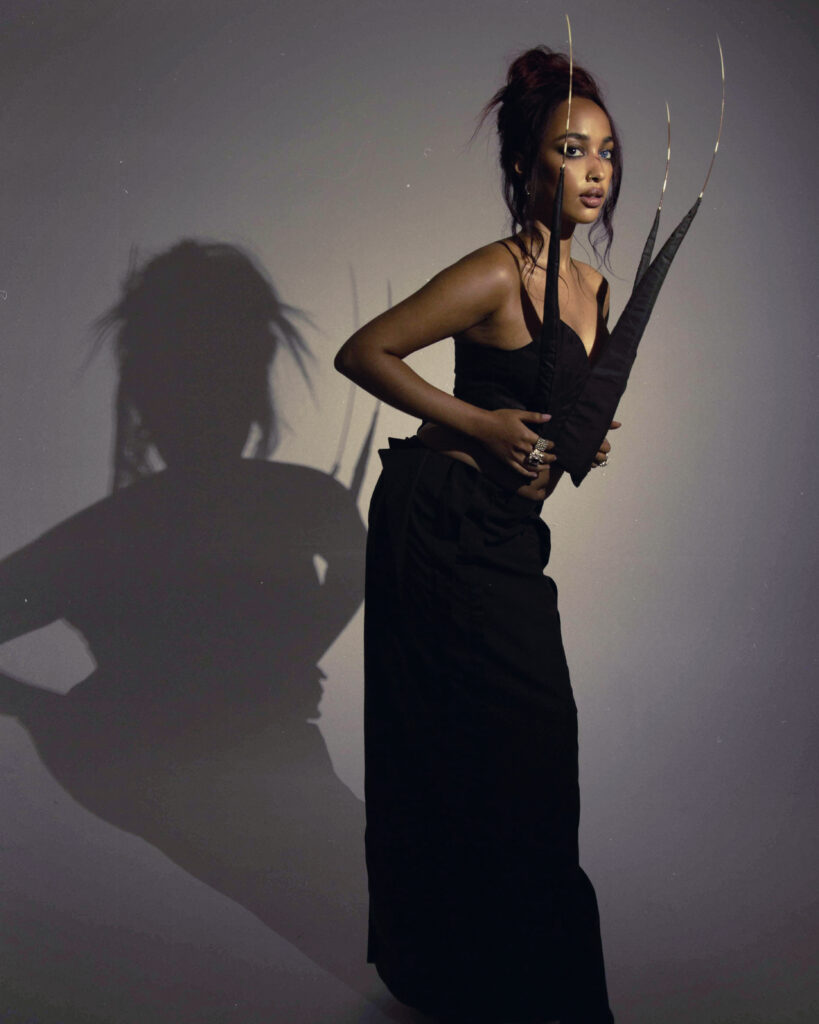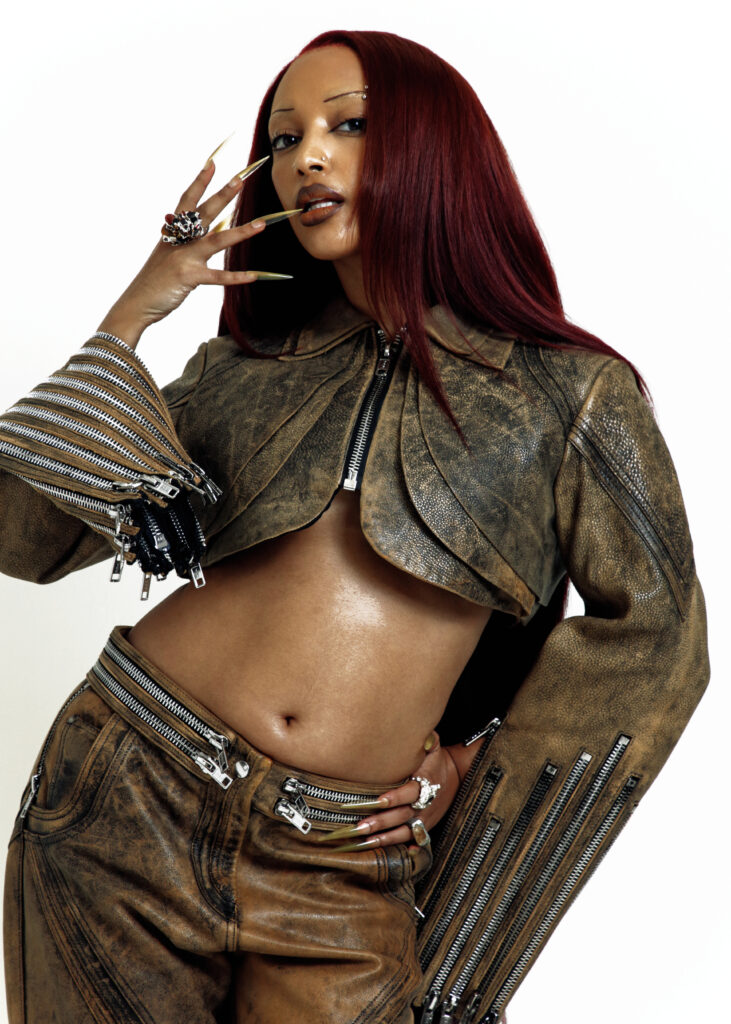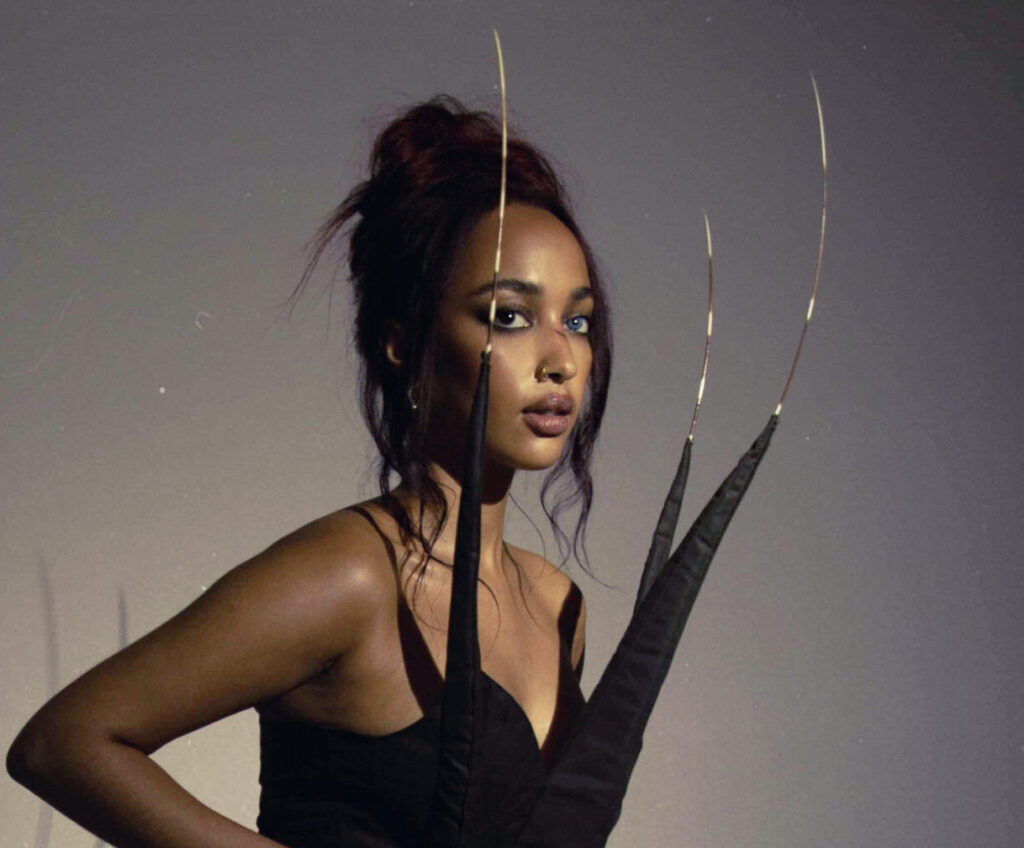Embracing vulnerability, marching to her own rhythm, and uncovering the true meaning of home.
Photographer LOUISA MENG @louisameng_
Stylist KATE HOUSH @katehoush
Makeup SOPHIA SINOT @sophiasinot
Hairstylist ROSS KWAN @rosskwan
Hair Color BRAD BAKER @bradbakerhair
Nails ELLA @ellavivii

Earrings, Rings JOE SPURGEON @joe_spurgeon
MATILDA LITTLE @a.little.merman
Words by Kimberly Haddad – Creative Copywriter
Having wrapped up successful tours alongside Giveon and with her highly anticipated album Children of The Night set for release this fall, Rimon stands out as one of the most alluring and refreshing new artists in the music scene. From debut hits like “Grace” and “Nighttime” to recent singles like “Can’t Forget,” “Flowers,” and the mesmerizing sounds of “City’s Burning,” this emerging Eritrean-Dutch artist artfully reveals her vulnerability through her music in a truly unique way. Rimon’s journey isn’t just about creating music; it’s about making a powerful statement about self-expression and individuality.
Backed by cosigns from the likes of Denzel Curry, EARTHGANG, and Drake, Rimon is boldly stepping into a new phase, aptly named “New Era, New Rimon,” as she climbs her way to the top through unabashed expression, strong opinions, and transparency in both her personal life and artistry.

REFERENCE STUDIOS @referencestudios
Rings MAUD TRAON @maudtraon
MATILDA LITTLE @a.little.merman
JAMES TAPNER-EVANS @justjjjewelry
AZULMALIN @azulmalin
Could you share your experiences growing up in Eritrea and how your cultural background has shaped your artistic expressions in music and art?
I’ve only stayed there until I was one years old due to the war, so I don’t have any recollection of it anymore. I don’t think it shaped my music in an artistic way, so far, but it has definitely shaped my persona and a strong sense of resilience that is definitely engraved in Eritrean culture.
Your music is known for its raw and emotive storytelling. How do you approach vulnerability in your songwriting process, and have there been any challenges in sharing such personal experiences with your audience through your music?
I think the moment I truly channel my vulnerability is when I make my best music. I have quite a lot of things to write about since I feel like I’ve been through so much while growing up. I hold on to a lot of things and never really talk about them until it all unfolds again on paper. Of course, it’s difficult sometimes because I strip myself. I’m not ready to be fully naked yet, so I use metaphors to talk about some of the deeper things, that way it doesn’t feel as direct.
In this era of “New Rimon,” what aspects of your individuality and artistry have evolved or transformed the most?
I think I’ve just evolved as a person a lot. I’ve become bolded, I’ve been standing more on business and not holding back in real life anymore in order to please people, hence the red hair. I can’t shy away from myself anymore and musically, that means being more honest and not sugarcoating my true feelings.
Children of the Night delves into themes of speaking up and navigating doubts in turbulent times. Can you talk about a particular song from the album that holds a special significance to you in terms of its message or emotional resonance?
“Back and forth” is one of them. It’s about growing up and how certain changes might have a life-changing impact. Staying in a city for love or leaving and pursuing your dreams. But also, small choices, almost like the butterfly effect, and how drastic the outcome can be, so you might be scared of them, especially when life gets a little serious in your mid-20s.
How do you see your music contributing to larger conversations on identity and empowerment in today’s society?
I’ve noticed there has always been a silver lining to my projects. There is always a message of positivity and empowerment. It’s the way that I live. I hope people take that away from my music and to try to be better in this world.
REFERENCE STUDIOS @referencestudios
”I definitely had to shape my own views about things that were unconventional to the elders in my family and went against how I was raised, but that’s also the beauty of growing up in two different worlds.”
As an Eritrean born, Amsterdam based artist, how do your cultural background and surroundings shape your perception of femininity, masculinity, and the pursuit of a fulfilling life?
That’s a very good question and I could go on for days talking about the layers of Eritrean and Ethiopian cultures, especially regarding gender since it’s so conservative. I’ve always been someone to beat to my own drum. I definitely struggled growing up, trying to fit in and be what was expected of me, whether it was my mannerisms, clothing, lifestyle, etc. I definitely had to shape my own views about things that were unconventional to the elders in my family and went against how I was raised, but that’s also the beauty of growing up in two different worlds. I’m very open minded and don’t really believe in set ways of how things should be. In regard to the pursuit of a fulfilling life, I definitely think the warmth and longing for togetherness is something that comes from my Eritrean background and really enjoying life to the fullest.
How has the Amsterdam music scene differed from what you were exposed to growing up, and how has it influenced your artistic growth?
The music scene before was mostly EDM and DJs who made noise internationally, which made the pursuit of wanting a music career as a kid almost like an impossible task. There wasn’t really an example, but recently, there has been a big change. There are so many great artists from here who are really making noise in the world across many different genres.
As someone who has moved around often, what does “home” mean to you? How do you create a sense of belonging and security in a constantly shifting environment?
I used to say, “home is where the people are I love.” This is partly true, but you can also create a home for yourself, aside from a physical one, by making your mind and body a place you enjoy being in. For the first time in my life, I’ve given meaning to “home.” I’ve moved into an apartment last year after a very turbulent time of traveling. I started focusing on my mental health, routines, spending time alone, going to the gym, and really working on creating stability, which keeps me centered on this roller coaster.
In moments of self-doubt or vulnerability, where do you find strength and inspiration to keep moving forward in both your personal and professional life?
I hear my mom talk to me in my head. She’s the most optimistic person I know and nothing that ever came her way took her down. Seeing that gives me the strength and reassurance that you just have to keep going. It’s okay to have off days or moments when you’re not feeling it anymore, as long as you pick yourself back up and finish whatever you promised yourself you’d do.
Do you believe there is a significant difference between who you are outside of your music and the persona you portray through your songs, and if so, how do you reconcile those two identities?
Not really. The only thing is that my songs might be a bit serious, but when you meet me, it’s like I’m just goofing around in life and I’m really not that serious. It makes sense since music has become my way of expressing the things I might not speak about in real life. Even on social media, I only show limited parts or myself. I kind of like that separation because it feels safe and comfortable, but in all honesty, it also feels like a form of self-sabotaging.
Are there any specific causes or social issues that you are particularly passionate about advocating for through your platform as an artist?
Definitely everything humanitarian related. Refugees, immigrants, wars. Everything that has to do with injustice period. Also, because it’s part of my own story and one day, I would love to actually help out on the grounds versus just speed up awareness.
Can you share any upcoming projects or collaborations that fans can look forward to, beyond your music releases?
I’ve been working on a project with my mother on the low, and some other ventures. I’m quite entrepreneurial and just love coming up with ideas and working on them. I can’t disclose exactly what it is now, but I will when the time is right.
Rings JOE SPURGEON @joe_spurgeon
MATILDA LITTLE @a.little.merman
You may also like
-
Staying Loud, Staying True: Spacey Jane’s Evolution from Perth to the World
-
Reframing Narratives with KATHERINE FLYNN
-
FIGHT TO THE OTHER SIDE: Hilary Roberts on Suffering, Freedom, and Sharing her Mafia Gifts
-
SEXY 4EVER – An Interview with INJI
-
BREAKING BREAD with GAVIN ROSSDALE: A Conversation about Music, Food, and the Art of Hospitality
-
UNCOVERED: The Liberation of MODEL ROZ
